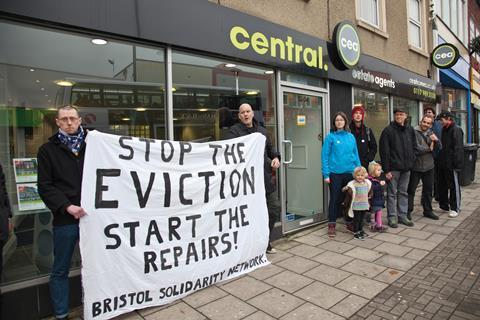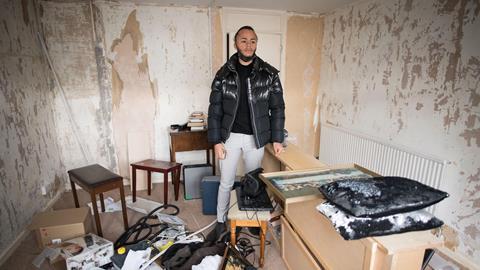Housing is an ‘utterly adversarial’ arena unsuited to mediation, hears Rachel Rothwell. But with legal aid rates unviable and cross-subsidy under threat, the government does little but talk about tenants’ rights
The low down
The squalid conditions endured by tenants in both the social housing and private rented sectors in England have been thrust into the spotlight with a series of shocking TV news stories, a damning report from the Housing Ombudsman and now a parliamentary inquiry. The real gamechanger for private renters will be the abolition of no-fault evictions, which currently give a great deal of power to landlords, pushing up rents and making it difficult for tenants to complain about disrepair. But since the Conservative 2019 manifesto pledge to do away with no-fault evictions, the government has so far taken no concrete steps to implement the reform, which is not only unpopular with landlords but could even have a knock-on effect on house prices more broadly.
Walls thick with black mould; plaster falling from the ceiling because of an unfixed leak; a corridor flooded by boiling hot water; an estate plagued by rodents; residents who feel hopeless and ignored. The UK’s social housing crisis was laid bare in a year-long series of reports by ITV News last year, and is now the subject of a parliamentary inquiry that began last month.

For the public, the squalor endured by many tenants in both social housing and the private sector is shocking. But for housing lawyers, it is something they see every day. ‘Mould, damp, leaks from other flats not being sorted out, leaks within flats, poor plumbing, heating systems constantly breaking, insecure accommodation where the locks on the front door don’t work; or in communal accommodation, the locks on the outer door don’t work and there’s anti-social behaviour. There are lots of difficult things to resolve, where landlords are not getting to grips with their repair obligations,’ says Simon Mullings, housing specialist at Edwards Duthie Shamash and co-chair of the Housing Law Practitioners Association.
He adds that a combination of factors means housing law is currently ‘having a moment’, and is front of the public’s mind. The poverty that has been building since 2009 austerity, now exacerbated by the cost of living and energy crisis; the Grenfell tragedy which threw a spotlight on unsafe housing; the pandemic, which laid bare the disparity in living conditions between rich and poor – all these factors have made people more aware of housing issues, Mullings suggests.
Despair at disrepair
As well as the parliamentary inquiry, the social housing sector is also under fire from the Housing Ombudsman Service. In a report on damp and mould published in October 2021, the ombudsman examined 410 complaints and investigated more than 140 landlords over a two-year period. It made findings of maladministration in a shocking 56% of cases; with failures often due to inaction, excessive delay, or poor communication by social landlords.
Andrew Brookes, head of the housing department at Anthony Gold, says: ‘It’s apparent that landlords in both the private and social housing sector are not performing their repair obligations in many cases; and this is a particular crisis in social housing.’
How has this state of affairs arisen? ‘The problems stem from a combination of things,’ notes Brookes. ‘One problem relates to tenant voices not being properly heard, which has come out very clearly during the ongoing Grenfell inquiry; and the government has published a white paper, Charter for social housing residents, which seeks to address this issue.
‘Also, housing associations have been putting undue emphasis on fulfilling the need for new housing, at the expense of maintaining existing stock,’ Brookes says. The need for new social housing is urgent, with 1.2 million households currently on local authority housing waiting lists in England, and a further 67,000 in Wales. In Wales, of course, housing is a devolved policy area whereas justice is not – a complicating factor that will be the subject of a later Gazette article.
William Ford, housing solicitor at Osbornes, highlights the financial pressure on English councils: ‘Increased rents, together with [cuts to] benefits, have caused huge problems not just for renters, but also for the local authorities with a duty to rehouse people… There are examples of local authorities disbursing people far and wide.’ Some London boroughs are reported to have rehoused people in Bradford, where housing is more affordable, for example.
'It’s apparent that landlords in both the private and social housing sector are not performing their repair obligations in many cases; and this is a particular crisis in social housing'
Andrew Brookes, Anthony Gold
For housing lawyers, disrepair claims can be a decent revenue source, with legal costs paid by the neglectful landlord when a claim succeeds. With fairly predictable outcomes, these claims are often offered to tenants under a conditional fee agreement. But the profits from housing disrepair claims are essential to any law firm that wants to offer a legal aid service to tenants facing eviction and repossession, because legal aid rates alone are simply unviable. A grade 2 fee-earner, for example, will earn £63 an hour on legal aid, compared with guideline hourly rates of £251.67 in London or £174.67 nationally.
But now this cross-subsidy of legal aid work is under threat. Plans to introduce fixed recoverable costs for civil cases worth up to £25,000 will significantly reduce the amount that housing lawyers will receive from defendant landlords when they win a case. ‘That cross-subsidisation has kept some of us going, but if that goes the impossible economics of legal aid alone will just continue to reduce the number of legal aid providers,’ warns Brookes. ‘Almost 40% of the population of England and Wales don’t have a housing legal aid provider in their local authority. Those advice deserts are growing year on year.’
Stumbling blocks
The ‘cladding crisis’ is one of the biggest problems in Michael Gove’s overstuffed inbox. In January, he wrote to developers setting a deadline of early March to agree a ‘fully funded plan of action’ for remediating unsafe cladding on medium-rise blocks, likely to cost £4bn.
The secretary of state for levelling up, housing and communities threatened the industry with restricting access to government funding and future procurements, using planning powers and pursuing companies through the courts, but the industry cannot come up with a satisfactory solution.

Andrew Brookes, head of the housing department at Anthony Gold, says: ‘It was hugely unfair that there was [initially] this cut-off point, where leaseholders in mid-rise buildings [as opposed to taller buildings] would be stuck with the full cost of these very expensive fire remediation works, so anything [that improves on that situation] is good. Michael Gove’s proposals are all about persuading the developers to take action, with a sort of threat of action if they don’t. It remains to be seen what will actually happen over the coming months; the jury is out on whether this is just a gesture, or whether it will really help.
‘So many of the people affected by these fire safety issues are of modest means; people on the first rung of the housing ladder, who bought a shared ownership flat. They find themselves faced with these huge service charge bills for dealing with not just cladding, but things like wooden flooring on balconies and insulation. That question of who pays for fire remediation work is an important part of my work as a housing lawyer at the moment.’
Perhaps ironically, the remote justice that has operated because of Covid has at times been helpful to tenants living in advice deserts. Ford, who is based in London where more legal aid housing lawyers are available, says: ‘During the pandemic, I was taking on cases in Devon. I instructed a barrister on a telephone hearing in Barnstaple... It’s pretty crazy, me sitting in Camden, representing someone in Devon.’
The extreme erosion of housing legal aid work was starkly illustrated by the Commons Justice Committee’s report The Future of Legal Aid, published in July. The number of legal aid matters started for social welfare issues, which includes housing and debt, was 422,703 in 2009/10. By 2020/21 this had plummeted to 17,385 – a 93% drop.
It is not just legal aid cuts that threaten tenants’ access to justice, however.
Housing lawyers are worried about the current push towards mediation across civil justice.
‘The government, the civil service, and some of the senior judiciary who are involved in these things have a real fetish for mediation, because they see it as part of a reformed justice service overall,’ says Mullings. ‘There are really good arguments for that. Our deep concern is that housing law is an utterly adversarial arena. There’s a big power imbalance… Imagine a landlord that wants a property back and a tenant wants to stay. How is that going to go in a mediation? There’s no halfway house. You can’t half stay in a property.
‘What does the tenant have to gain from mediating themselves out of their home? Because things like benefits are all stacked against the tenant generally, then mediation is just covering up a nasty little process where someone loses their home because there’s no possible way that they can afford it; by saying “oh well, there was this mediation process, and in the end it was agreed that the tenant would leave”. Well that’s not what society needs to hear about what’s going on in the sector. If the sector is dysfunctional – and I say it is, utterly dysfunctional – then society needs to know that. The brutality of it needs to be made clear, because ultimately the way in which we get legal change will be through the usual democratic processes. It’s wrong to hide brutal rental policy – or lack of policy – behind a curtain of mediation.’
Levelling the land
Earlier this month, Boris Johnson appointed Stuart Andrew MP as the new housing minister; the 11th person to occupy the role since 2010, and – like one in four Tory MPs – a landlord. Andrew was immediately greeted by negative headlines screaming that the new housing minister was a ‘landlord who defeated law to make homes “fit for human habitation”’; referring to his vote against an unsuccessful amendment to the 2016 Housing and Planning Bill.
Andrew’s boss is Michael Gove, who was appointed secretary of state for levelling up, housing and communities in September. Gove’s heavily trumpeted Levelling Up white paper, published on 2 February, was criticised for its lack of substance, and mocked for being ‘padded out’ by irrelevant descriptions of ancient civilisations. But Gove is regarded as an effective minister. ‘There’s generally a feeling that Michael Gove has rolled his sleeves up and got on with things,’ says Mullings. ‘It’s not enough, but that’s the mood music, that things are moving in the right direction.’
One area where Gove has already taken action relates to so-called ‘fleecehold’ scandals, where housing developers incorporate clauses into lease contracts obliging leaseholders to pay escalating ground rents. A bill banning ground rent on new leases received royal assent on 8 February.
Mark Chick, head of the landlord and tenant team at Bishop & Sewell and director of the Association of Leasehold Enfranchisement Solicitors, explains: ‘These leasehold scandals predominantly affected properties in the north-west, but it was a national problem. There was an estimate at one time that 14,000-odd properties were affected, though the figure may be higher.
‘In December 2017, Sajid Javid was housing minister. He made an announcement on the floor of the House that they were going to ban ground rent for new leases, and prohibit the use of leases for houses save where that’s absolutely necessary… They’ve now got as far as banning ground rents for new leases, but as to banning leases for houses, there’s nothing in the pipeline on that.’
For housing lawyers, the most significant aspect of Levelling Up was that it reaffirmed a government commitment to a radical change in the rental market: the abolition of ‘no-fault evictions’. But while it indicated that a further white paper would be published on this ‘in the spring’, there is still no timetable for implementing the reform.

The regime of no-fault evictions means that landlords are currently able to evict tenants for no reason. Campaigners have been pressing for the scrapping of this regime for years and in 2019 this position was adopted by the Labour party. It proved so popular that the Conservatives also adopted it, and it appeared in the manifestos of both parties in 2019. Nick Bano, barrister at Garden Court Chambers, explains: ‘Then it was in the [Conservative government’s] 2020 Queen’s speech, and then it was in the next Queen’s speech, and they’ve kept on deferring it’.
A common theory among housing lawyers is that when the Conservative party adopted the policy, it did not fully comprehend the implications. ‘They’ve now realised that it’s actually a much bigger deal,’ says Bano. ‘They were happy to put it in the manifesto because, on the face of it, abolishing no-fault eviction sounds like a nice thing to do; and it’s free. I don’t think they quite realised that it’s a really fundamental change to the way the private rental market works. Because you’re effectively bringing in security of tenure, which affects all sorts of things.’
As well as being unpopular with landlords, the move might even affect the electoral touchpaper of house prices. ‘Broadly speaking,’ Bano says, ‘one of the reasons that [rental] prices got so out of control is that landlords can just constantly ratchet up rents. You have these very short tenancies and at the end of them or towards the end the landlord can just say: here’s the new rent, and if you don’t like it, I have the power to evict you.
‘If you take that power away, it’s much more difficult to raise rents. Rents could rise a lot slower. My suspicion is that this will have an impact on housing prices more broadly… You can see why government is nervous about this. That’s why it’s been delayed so much.’
If no-fault eviction is scrapped, the likelihood is that powers to evict tenants if they are behind on their rent, engage in anti-social behaviour, or because the landlord needs the property back, will be strengthened (although landlords point out that their ability to evict tenants may be hampered by court delays). But the tenant will still essentially have been given security of tenure, something that has not existed for decades. This will end the misery faced by many people trapped in an endless, stressful cycle of moving from one rented property to another, with the impact that can have on mental wellbeing, schooling and employment.
It will also have an added benefit: making it easier for tenants to exercise their rights to have repairs carried out. ‘It’s very difficult to effectively challenge your landlord for disrepair at the moment, because you have that threat of a no-fault eviction hanging over you,’ explains Bano. The implicit threat is that if a tenant complains, the landlord will simply evict them and find a new tenant who doesn’t complain. Such ‘retaliatory convictions’ are theoretically prohibited in law, but in practice are a frequent occurrence. ‘So if you abolish no-fault evictions, immediately standards are going to go up, because tenants can take meaningful action to bring things up to scratch,’ Bano says.
Broader shift
For Chick, abolishing no-fault evictions is part of a broader picture: ‘It shows the general shift in housing, the rebalancing of rights as more people are living in rented accommodation. With [high] house prices meaning home ownership becomes less of the norm, you see a trend towards a more regulated system for the tenant.
‘If you look at places like Germany, people have much longer security of tenure, and lots of property is owned by pension funds, which receive the income from it. People don’t see home ownership as being top of the list of their things to do. But I’m not sure how well that sits with the national psyche here.’
'The government can talk about tenants’ rights all it wants. But until it actually gets round to abolishing no-fault evictions, it is all just window dressing'
Nick Bano, Garden Court Chambers
Mullings would like to see more social housing: ‘Long-bearded hippies like me think social housing is the way to go, to ensure you have a functioning society. But Conservative governments are ideologically opposed to state housing, and the “right to buy” wholesale selling off of publicly owned houses is the signifier of that. Since right-to-buy, the private sector has become more and more important in ensuring that people have places to live. So I think ending no-fault evictions is seen as a way of protecting the private rented sector, as opposed to expanding the state sector.’
The proof of the pudding, however, will be in the eating. ‘Successive governments have not yet moved on abolishing no-fault evictions,’ notes Mullings. ‘The pandemic was a good time to do it, because nobody wanted people to be evicted, and there was the stay on possession proceedings, which could easily have come along with some initial renters’ reforms. There were bills drawn up ready for government to use if they wanted to; they’ve just chosen not to.’
Bano says: ‘The government can talk about tenants’ rights all it wants. But until it actually gets round to abolishing no-fault evictions, it is all just window dressing.’

Rachel Rothwell is a freelance journalist
































No comments yet